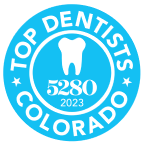
For some, the idea of pulling teeth might cause them to pull their hair out too. However, you never know what the future holds. A dental extraction might be part of your journey to better oral health one day. Do you need to have your tooth pulled soon? If so, continue reading this post-dental extraction guide that focuses on what to avoid after tooth extraction by our highly rated Metropolitan Dental Care team. Book an appointment at our Denver location so that we can skillfully prepare you for every step of this dental procedure.
Following all tooth extraction care instructions reduces the risk of complications that could compromise your recovery. So, here are our top five “don’t’s” that we encourage you to do.
1. Don’t fast from food.
Dental tissue is soft, sensitive, and vulnerable, especially after surgery. Not to mention that your mouth or jaws might feel sore after surgery, making talking, laughing, and eating challenging. Also, the chance of solid food particles getting stuck in the incision site and raising the risk of infection can make some individuals feel nervous about eating again.
In response, it may be tempting to skip some meals during recovery. Also, some get stressed and overwhelmed when changing their diet to non-solid foods after oral surgery.
Instead, consume a nutrient-dense diet of soft food and plenty of liquids while your extraction site is healing. On the bright side, you can eat delicious treats that you wouldn’t normally eat in larger quantities, such as milkshakes, mashed potatoes, and ice cream.
2. Don’t consume scorching solids or boiling liquids.
Speaking of foods that you can eat, soup is a great choice—as long as it’s not burning hot. Food and drinks that are too hot can exacerbate swelling.
3. Don’t smoke or drink alcohol.
Although getting a tooth pulled can be a stressful experience for some, it’s crucial to turn your cheek on some bad habits while your extraction site heals (in this instance, smoking and drinking). First of all, smoking limits oxygen in the smoker’s bloodstream, which can hamper the healing process, increase discomfort at the extraction site, and significantly increase the chance of developing a dry socket. Conversely, alcohol can impede healthy blood clot formation or dislodge it.
4. Don’t overexert yourself.
While sometimes overlooked, resting is essential to healing. So, plan on limiting physical activity for the first 24 hours after tooth extraction, rest during the day with your head slightly elevated, and go to bed early.
5. Don’t ignore the adverse medication side effects.
Your Metropolitan Dental Care dentist might prescribe medications to reduce the risk of infection, discomfort, or other adverse reactions. If you get an upset stomach, itch, or have a rash, after you take your medication, contact our office. Your dentist might be able to prescribe an alternative medicine with fewer negative reactions.
Our Denver Team Explains What to Do and What to Avoid After Tooth Extraction
Remember that it is always better to err on the side of caution after removing a tooth. Taking care of yourself and steering clear of certain habits can help you feel better and heal faster.
Occasionally, a tooth may become extensively damaged from illness, injury, infection, or decay. Other times, individuals require dental extraction to deal with overcrowding before orthodontic treatment. Regardless of why you need to pull a tooth, Metropolitan Dental Care can help you understand what to do and what to avoid after tooth extraction. Book an appointment with us by calling 303-534-2626 or messaging us online.

